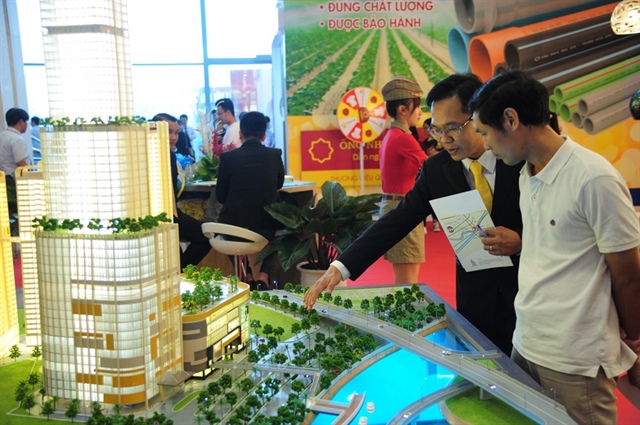|
Booming West Hanoi property driven by infrastructure investments
Hanoi's real estate market is expected to continue having positive developments in the upcoming quarters.
With strong investment in urban infrastructure, real estate in West Hanoi is expected to be a strong driver when valuable supply will be listed on the market, according to experts from local property organizations.

The high-rise buildings in Dong Anh District. Photo: Thanh Hai/ The Hanoi Times
|
In recent years, the West has been prioritized for strong investment with a flexible and synchronized infrastructure system. Major transportation routes are gradually taking shape to connect this area with central Hanoi, such as Thang Long Boulevard, Road 32, the Cat Linh-Ha Dong elevated railway, and the To Huu-Le Van Luong radial axis.
According to the Vietnam Association of Realtors, these projects in the west are also riding the wave of investment, as the Le Quang Dao Road (the section from Thang Long Boulevard, Nam Tu Liem District to the border with Duong Noi urban area, Ha Dong District) was opened in April and is expected to be operational in October 2024.
The city's key projects include Ring Road No. 3.5 and Thang Long Boulevard, with an investment of over VND2.4 trillion (US$94.2 billion), and Ring Road No. 4, which is expected to be operational in 2027 and is expected to change the face of the west and connect north-south routes, the association noted.
In particular, Hanoi recently approved an investment plan for Metro Line 5 (Van Cao - Ngoc Khanh - Lang - Hoa Lac) with a total investment of VND65.4 trillion ($2.56 billion). When completed, which is expected by 2025, the metro line will help further brighten the face of the West, according to the association.
In addition to investments in the transportation system, the social infrastructure of the region is also developing rapidly, with hundreds of schools, hospitals, modern sports and cultural centers, and parks being built in a short period of time.
The association reported that the relocation of government offices to the West has created a hub for thousands of domestic and foreign companies. This has led to a wave of migration of civil servants, foreign experts and skilled workers to the western part of the city.
The wave of migration is increasing the demand for housing in the area, contributing to the rapid recovery of the real estate market in western Hanoi, the association experts said.
West Hanoi leads in pricing

Buyers take a look at a real estate project in Hanoi. Photo: Cong Hung/ The Hanoi Times
|
According to a report released by Savills Vietnam, the West is one of the two regions that have given a boost to the Hanoi market in recent months, contributing to the number of units sold reaching 5,308, up 74% quarter-on-quarter and 99% year-on-year.
The Vietnam Association of Realtors said that for many consecutive quarters, apartments in the West have dominated the market in terms of supply and transactions. The districts of Bac Tu Liem, Nam Tu Liem, and Cau Giay have consistently led the market since 2011, with a supply share of more than 30%. This area has the largest office supply in the capital, with a market share of 50%, equivalent to 873,700 square meters of office space.
The West has also continued to set new price levels and has recorded the most active volume of transactions in the capital city. Batdongsan.com.vn reported that the price increase rate of apartments in the West is 7-15% higher than that of apartments in other areas of the city. Depending on the location and project, the average increase is VND300-700 million ($11,778-$27,483) per unit.
Do Thu Hang, Senior Director of Research & Consulting Department, Savills Hanoi, believes that the area will continue to be the focal point of Hanoi's future development, with a greater focus on quality, significant improvements in transport infrastructure, and landscape enhancements to reduce population pressure and high traffic volumes.
She added that Hanoi's property market is expected to continue to develop positively in the coming quarters. She saw a positive change in the mindset of apartment buyers and a shift in demand in Hanoi. In the past, buying an apartment required careful consideration.
However, Hang also explained that in apartment projects where the price is not in line with the quality of the product, it is unlikely that buyers will make a quick decision. The projects that attract the market's attention are those of reputable developers with products that offer certain quality guarantees and other legal factors.
These developers often work with leading consulting firms, from architecture to landscaping to interior design, to enhance the quality of their products and the prestige of the project, she added.
Hanoi Times
|